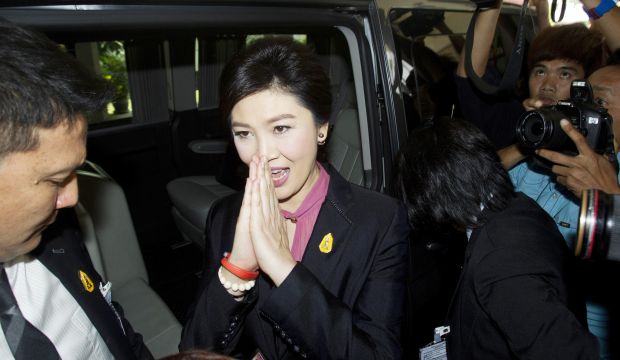
Thailand’s former prime minister Yingluck Shinawatra leaves parliament in Bangkok, Thailand on January 9, 2015.
(AP photo/Sakchai Lalit)
Yingluck faces 10 years in prison if found guilty in the case, seen by her allies as part of an attempt by an elite minority to crush her family’s political machine, which has repeatedly won power through democratic elections over the last decade.
In a post on her Facebook page, Yingluck insisted she was innocent and called on the judiciary to give her a fair trial—unlike past cases she said were “politically intended to destroy me.”
Yingluck was ousted from her post as prime minister by a court decision that came two weeks before the military staged a coup last May. Earlier this year, she was impeached by the military-appointed legislature, which banned her from politics for five years.
On Thursday, Supreme Court Judge Weerapol Tangsuwan said that a nine-member judicial panel had studied documents submitted by prosecutors from the Attorney General’s Office and accepted the case since it fell within the court’s jurisdiction. He set the trial for May 19.
Yingluck, who was not present in court, is being charged with dereliction in overseeing the controversial rice subsidy program, which temporarily cost Thailand its crown as the world’s top exporter.
The program was a flagship policy that helped Yingluck’s Pheu Thai Party win elections in 2011, and Yingluck has argued it was aimed at helping poor farmers who were paid about 50 percent above what they would get on the world market. The program, however, racked up losses of at least 4.46 billion US dollars as the Thai government stockpiled mass quantities of rice. Prosecutors say Yingluck ignored multiple warnings from several state agencies about possible corruption—none of which has yet been proven in court.
Earlier this year, the National Anti-Corruption Commission recommended the Finance Ministry sue her personally for at least 600 billion baht (18.4 billion dollars).
Thailand has been plagued by political turmoil that boiled over after the army ousted Yingluck’s brother, Thaksin Shinawatra, in a 2006 coup. The putsch was part of a societal schism that in broad terms pits the majority rural poor, who back the Shinawatras, against an urban-based elite establishment supported by the army and staunch royalists who see Yingluck’s family as a corrupt threat to the traditional structures of power.
Yingluck’s opponents argue the Shinawatras have used their electoral majority to impose their will and subvert democracy.
The day Yingluck’s trial begins has significance in Bangkok. It marks the fifth anniversary of a bloody army crackdown against demonstrators backing the Shinawatras who had occupied downtown Bangkok for two months. More than 90 people were killed in the protests, which ended with parts of the city shrouded in black smoke from burning buildings.
